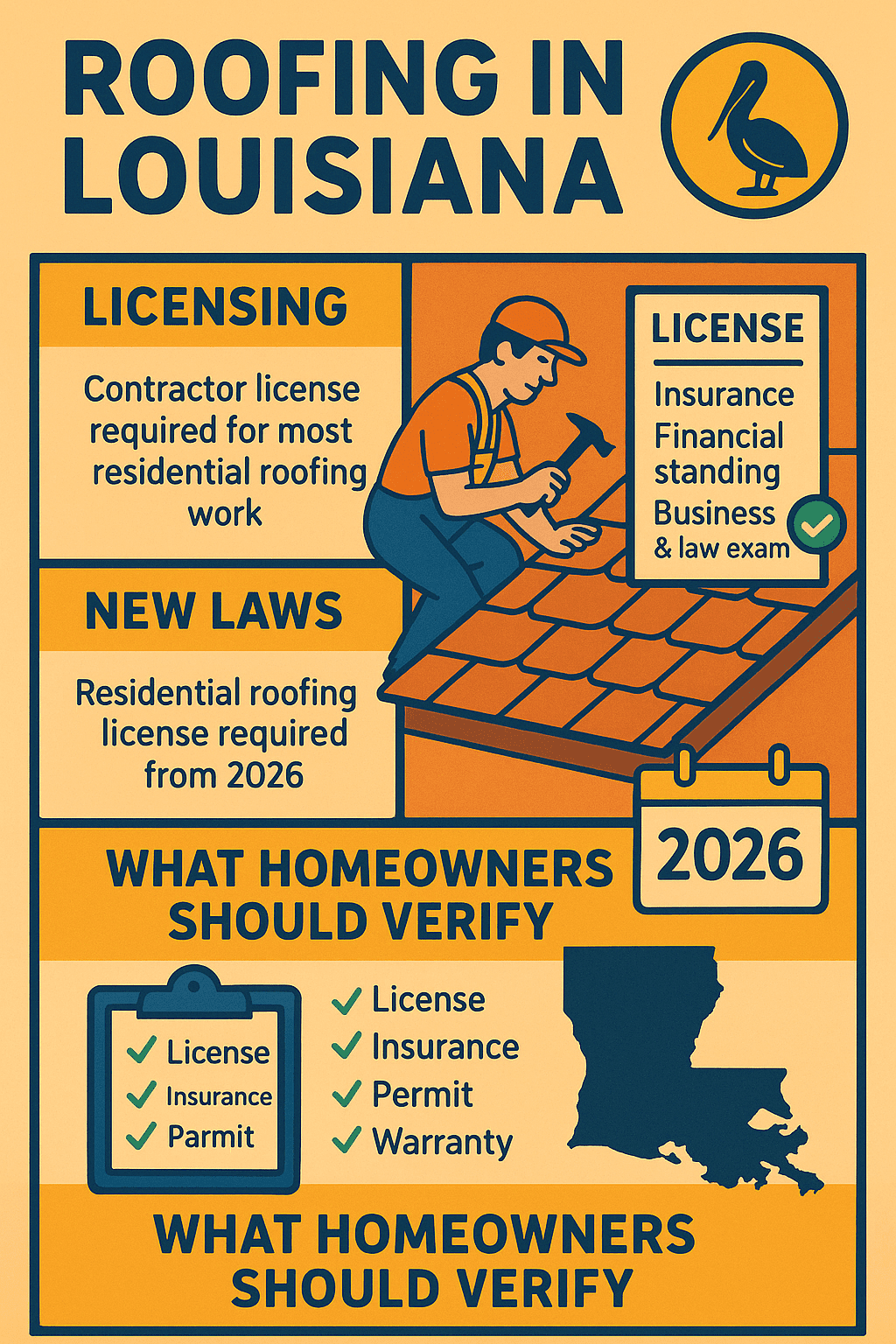Imagine hiring someone to re-roof your home, wound up with leaks next season, and then discovering the “contractor” lacked proper credentials. That’s not just embarrassing — it’s risky. In Louisiana, roofing is not a free-for-all; the state requires contractors to hold certain licenses, carry insurance, and comply with regulatory changes. And starting January 1, 2026, new laws make these requirements more specific for roofing work.
Today’s Credentials for Roofing Contractors in Louisiana
State Licensing
Louisiana’s licensing system for contractors is regulated through the state licensing board. Roofing contractors fall under the broader umbrella of residential construction, home improvement, or commercial classification depending on the scale and type of work.
– For residential projects over $75,000 (labor + materials), a Residential Contractor License is required.
– For specialty residential work like roofing where the project value exceeds $7,500, the law also requires that the specialty contractor be licensed.
– Projects valued between $7,500 and $50,000 (residential home improvement range) require a Home Improvement Registration.
– Insurance is part of the package: proof of general liability insurance (at least $100,000) and proof of workers’ compensation must accompany license or registration applications.
– Applicants need a minimum net worth of $10,000 (financial statement) as part of the application.
– They must pass Business & Law and trade exams, where applicable.
In short: a roofer working in Louisiana must often be a licensed or registered contractor under state law, depending on job size.
Local / Parish / Municipal Permits & Credentials
Even with a valid state credential, roofers must often comply with local permit codes (city or parish). Failing to pull a building permit when required can lead to penalties, delays in inspections, or even invalidation of your homeowner’s insurance for certain claims.
Manufacturer Certifications & Credentials
Beyond legal licensing, many roofing manufacturers require credentialed installers for warranty coverage of labor and extended warranty options. These credentials typically involve training, inspections, documented installs, and adherence to specs. If your roofer isn’t credentialed with the shingle manufacturer, you may lose access to premium warranties.
—
New Laws Going Into Effect (2025–2026) & Their Impact
Creation of a New Residential Roofing License Classification (Effective Jan 1, 2026)
Starting January 1, 2026, a residential roofing license (or subclassification) will be required for any residential roofing project valued at $7,500 or more. Prior to this, a roofer might operate under a broader residential or commercial license; going forward, roofing work must be under the more specific credential.
Contractors currently holding residential construction, building construction, or commercial roofing licenses will be exempt from taking the new roofing trade exam.
The act also codifies requirements around permitting: it becomes a violation to begin work before a permit is issued, misrepresent project scope or value, or avoid required inspections.
What Roofers Must Do to Stay Compliant
– If roofing jobs of $7,500+ are in your pipeline, secure or upgrade your license by the 2026 deadline.
– Review whether your current residential or commercial license already qualifies you for exemption from new exam requirements.
– Ensure your business consistently pulls permits, documents inspection compliance, and never begins work prior to permit approval.
– Update internal systems: job costing, documentation, licensing tracking, and compliance flagging for projects nearing the threshold.
– Communicate to clients that post-2025, only properly licensed roofers can legally bid or work on their roofs; this can be a selling point.
—
What Homeowners in Louisiana Should Demand
Must‑Verify Credentials
Here’s a practical list for your contract meeting:
1. State Contractor License or Registration Number
– Confirm that the roofer or company is currently active.
– Make sure the classification includes Residential Construction or roofing specialties.
2. Insurance Certificates
– General Liability (≥ $100,000)
– Workers’ Compensation, if they employ staff
– Ask your name as certificate holder, so you get notice if coverage lapses.
3. Proof of Financial Standing
– The referenced $10,000 net worth requirement is part of licensure.
4. License Compliance for the Scope of Work
– For work over $7,500 (2026+), the roofer must be licensed specifically for roofing or already hold a residential license covering roofing.
– If your project is under that threshold but over $7,500, check whether it qualifies as home improvement registration.
5. Proof of Permit Pulling & Inspections
– The roofer should commit in writing to pulling necessary local permits and scheduling inspections.
– No permit = red flag, especially after the new law penalizes work done prior to permit issuance.
6. Manufacturer Credentials & Warranty Credentials
– Ask whether the roofer is credentialed by your chosen shingle or roofing manufacturer.
– Request proof or number.
7. Contract Itemization & Scope Documentation
– Detailed materials, flashing, underlayment, ventilation, tear-off vs overlay, and scope.
– Include photos (before, during, after) especially relating to leak-prone areas.
– Warranties spelled out (materials + workmanship, who issues the warranty).
Red Flags to Watch For
– Refusal to show active license or insurance.
– Using only a local “occupational” or “business license” instead of a state contractor license.
– Contract language that lets them skip permit or inspections.
– Guarantees that sound unrealistic.
– No documentation or no backing of manufacturer warranty.
—
Risks of Hiring Uncredentialed Roofers
– Legal Penalties & Stop Work Orders: Performing roof work without the proper license can result in fines or cease-and-desist orders.
– Warranty Voids: Manufacturers often void warranties if the installer isn’t credentialed.
– Insurance Claims Denied: If your contractor lacks liability or workers’ comp coverage, damage or injuries may fall on you.
– Poor Quality & Liabilities: Unregulated roofers may cut corners: improper flashing, ventilation gaps, under-nailing, etc., leading to leaks, rot, or catastrophic failures.
– Difficulty in Recourse: When things break, unlicensed contractors are harder to trace, enforce collections against, or bring before regulatory boards.
—
Sample Louisiana Roofing Contractor Profile (Hypothetical Case)
Let’s create a sketch of a “good” roofer in Louisiana — call them “Bayou Roof Pros, LLC.”
– They hold an active Residential Construction license with the state licensing board, verified in real time.
– Their license classification includes Specialty Residential Roofing / Construction.
– They maintain $500,000 general liability insurance and carry workers’ comp for their crew.
– They are credentialed with major shingle manufacturers — eligible to issue extended warranties.
– Their estimates explicitly state “will pull all required city/parish permits,” list manufacturer products, include “photographic documentation of flashing, underlayment, nailing,” and warranty terms.
– They commit that for any residential job over $7,500 (from 2026 onward), work will be under the appropriate licensed roofing classification.
– They schedule inspections and keep clients updated when permits are approved or inspections passed/failed.
That’s the kind of contractor you want over someone who just says “I roof cheap, I can start tomorrow.”
—
Conclusion & Takeaways
– Roofing in Louisiana is regulated: any serious residential roofing work generally requires a contractor license or registration.
– Big change ahead: as of January 1, 2026, a residential roofing license must be held for jobs $7,500 or more, or an equivalent residential license with roofing rights.
– Homeowners have power: demand proof of license/insurance/permit-pulling/credentialing — don’t skip that.
– Unlicensed work = risk: warranties voided, insurance headaches, legal penalties, poor quality, etc.
– Plan ahead: if your neighborhood or parish has stricter local codes or hurricane zones, your contractor may face additional scrutiny or local licensing beyond the state.































